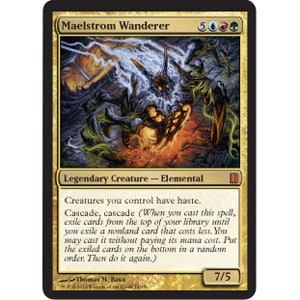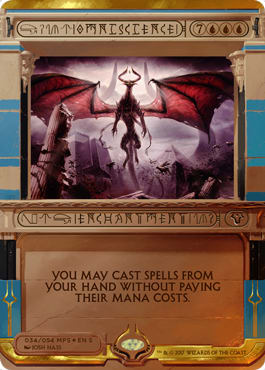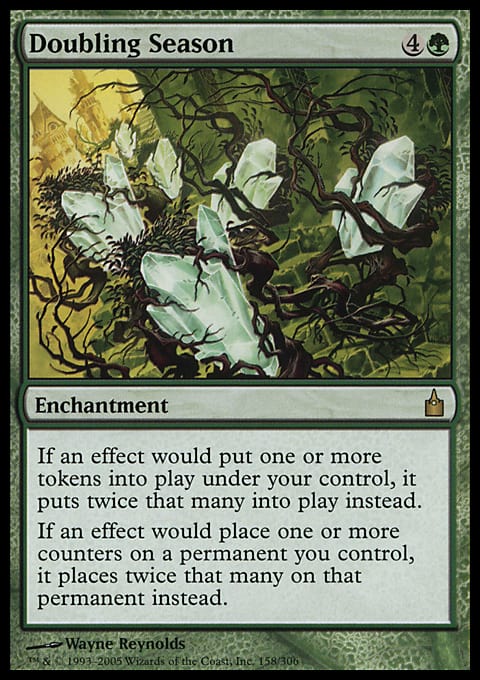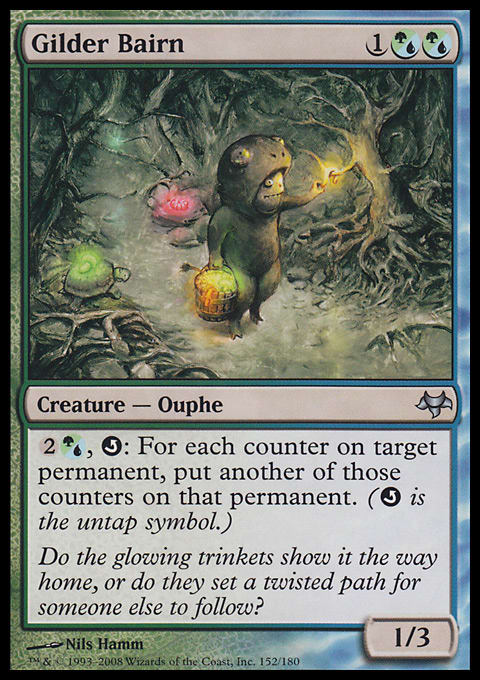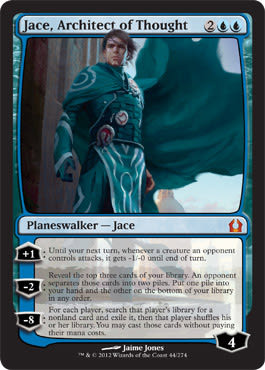It’s the place in the Magic player’s universe where you draw the cards you need in the exact sequence you want them while your opponent does nothing to stop you, creating a mind-explodingly-awesome series of plays that results in you winning the game in spectacular fashion.
New and inexperienced players are tempted by the riches of Magical Christmas Land—Marshall and Jon on the Limited Resources podcast call the mindset B.C.S.M.: best-case-scenario mentality. This can apply to card evaluation in terms of both Limited and Constructed play, as players include cards in their decks having imagined perfect scenarios for them . . . only to draw the cards in the real world, in real games, and have them not play out as expected.
Johnny players thrive in Magical Christmas Land. This applies to new, inexperienced, and veteran Johnnies alike, as some of us just can’t resist the call of playing with subpar card combinations in hopes that—one day—we’ll pull that perfect draw.
And Now for a True Story
Most Saturday nights, I head home after work, relax, browse the Internet, watch TV, and edit some articles for GatheringMagic. A week ago, I was instead persuaded to head over to my local game shop to play some games, some of which ended up being Commander. That was the first step out of my comfortable routine and into—what I would later learn to be—Magical Christmas Land.
Some of you will have seen this combo before, and you’ll see it coming as I begin my story. But whether or not this is the case for you, this is a good example of a Pocket Combo. I saw it on the Internet a few weeks back, and after acquiring the pieces, I threw them in a deck. Anyway, back to the narrative . . .
The game started off a little slowly with my Maelstrom Wanderer deck. I had one of the deck’s new combo pieces in my hand—and it’s a good card in its own right—but I missed a couple land drops, which impeded my ability to cast any of the deck’s superfluous mana ramp. There was little pressure from the rest of the table, though, and after a few turns, I was finally able to cast Maelstrom Wanderer. Many know the value two cascades can create, especially from an 8-mana spell, so I wasn’t too worried about my in-game situation anymore—I’d reached eight lands, and the deck would be able to function just fine from there. It’s worth noting that at this point, my opponents were all tapped out.
I revealed a few cards from the top of my library—lands and a Praetor's Counsel perhaps—and the first 7-mana-or-less spell I discovered was a non-combo-related, randomness-generating addition from Gatecrash: Unexpected Results. This spell is a bit of a cascade in itself except that it gives zero zonots in regard to mana cost. I shuffled my library, had my friend cut, and—excited to resolve this new card for the first time—picked up the top card of my library, held it over my head, and slammed it down on the table without looking. All but psychologically prepared to reveal a land, I lifted my hand and saw . . . out of the remaining eighty or so cards in my library . . . Omniscience. Unexpected results indeed!
Everyone’s eyes widened and chairs creaked, and my unfettered giggling began with subdued jitters, but there was still another cascade to go. I revealed the top few cards of my library, this time hitting Etherium-Horn Sorcerer—not bad for a board presence, but ultimately just reducing the power level of the next spell I cascaded into. However, my deck isn’t built to always cascade into super-powerful haymakers; I’m perfectly happy hitting an Explosive Vegetation and Elvish Visionary.
I cascaded again, this time with the 6-mana cost of the Minotaur, and I hit another new component of the deck: Doubling Season. My giggling level rose. I usually keep a straight face in games, for the purposes of both sportsmanship and strategy, but I could already tell I was halfway through the Conjurer's Closet (Magic’s closest wardrobe equivalent?) and into Magical Christmas Land (that’s Narnia—explaining metaphors makes them cooler). And I was only one card away from completely entering the realm of all Magic players’ hopes and dreams.
The cascading was done, but I had a few draw spells in my hand, and with Omniscience, that meant I could cast them for free . . . but what were the chances? I Concentrated to start the Omniscience-fueled chain of spells that I expected I’d be engaging in. But as unlikely as it is in real life, it is exactly that amount of likely in Magical Christmas Land: The three cards included the exact one I was looking for.
I cast my favorite planeswalker: Tamiyo, the Moon Sage. Due to Doubling Season’s effect, she entered the battlefield with 8 loyalty counters—just enough to activate her third ability, granting me an emblem that, for the rest of the game, would cause any card put into my graveyard to return to my hand.
On the Magic Cruise 5, I traded a foil Sphinx's Revelation for the aforementioned Doubling Season and a copy of Jace, Architect of Thought. The latter card had been the lone combo piece I started the game with, and I cast it. Jace also entered the battlefield with 8 loyalty, and I activated his third ability and returned him to my hand (with Tamiyo’s emblem). Visibly pleased with myself and the highly improbable sequence of events, I demonstrated that I could repeatedly cast and activate Jace, casting for free all of the spells in each player’s library and then attack each player with all of his or her own creatures (thanks to Maelstrom Wanderer’s haste-granting addendum). While I would have preferred to physically search out all the spells I wanted to cast, pile them on the table in front of me, and then turn them sideways in my combat phase, my opponents preferred to concede.
Engaging in improbable-but-awesome Magic: The Gathering sequences is among the primary reasons I still enjoy the game after all these years. While my friends might have rather played the game without me comboing off in the relatively early turns (it was turn six or so—that’s early for casual Commander, right?), they were good sports and considered the result satisfactory. We played again, and I used Karador, Ghost Chieftain instead.
Since then, I’ve played my Maelstrom Wanderer deck one more time, and due to a good draw that involved Jace, Architect of Thought, Doubling Season, and Early Harvest, I was able to cast all three cards in one turn to immediately cast Omniscience from my library and Elspeth, Knight-Errant (for an instant Indestructibility emblem) and Time Stretch from my two opponents’ libraries. Two extra turns was plenty.
While I like slotting in Pocket Combos—Hornet Sting had its turn—Maelstrom Wanderer’s is really not meant to be a combo deck.
For an early Valentine’s Day present, my girlfriend gave me a beautiful foil copy of Gilder Bairn. I’m going to take out Doubling Season and replace it with that cute little Ouphe. That way, I can still perform the combo, but far less efficiently, and Doubling Season can do its good work in a deck with more tokens and less value generation: my Damia, Sage of Stone Zombies deck. And hey, maybe I’ll one day be able to cast Vraska the Unseen with Doubling Season and Akroma's Memorial on the battlefield. That makes six 1/1 Assassins with flying, first strike, vigilance, trample, haste, protection from black, protection from red, and “Whenever this creature deals combat damage to a player, that player loses the game.” How many opponents do I have again?
TL;DR
Last week, I used Unexpected Results to cast an extremely lucky Omniscience and then proceeded to combo off with Doubling Season, Tamiyo, and Return to Ravnica Jace. It was pretty early in the game, and randomness—rather than tutoring and/or planning—yielded me the cards I needed. It was Magical Christmas Land, and expecting such a sequence would be B.C.S.M.
If the problem isn’t that you didn’t read, and rather that you can’t read, this is for you:
Until next time, I’m Andrew saying, “Doubling Season is, like, super-broken.”
Andrew Wilson
fissionessence at hotmail dot com














